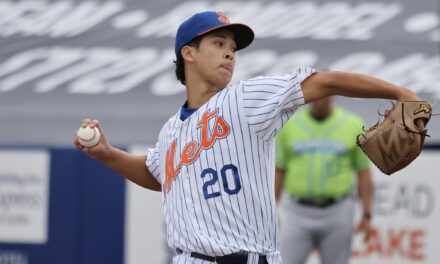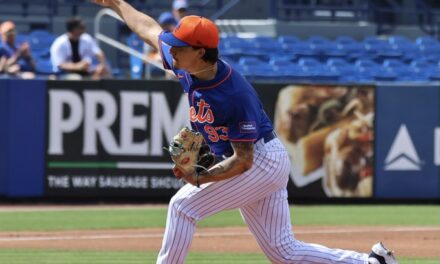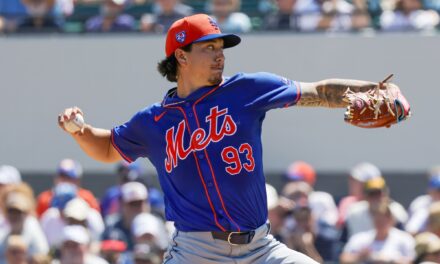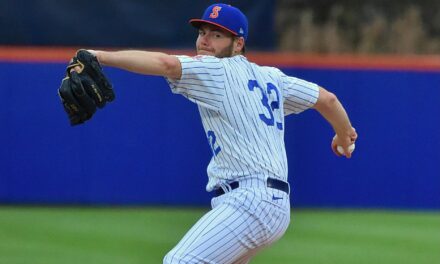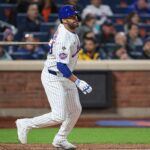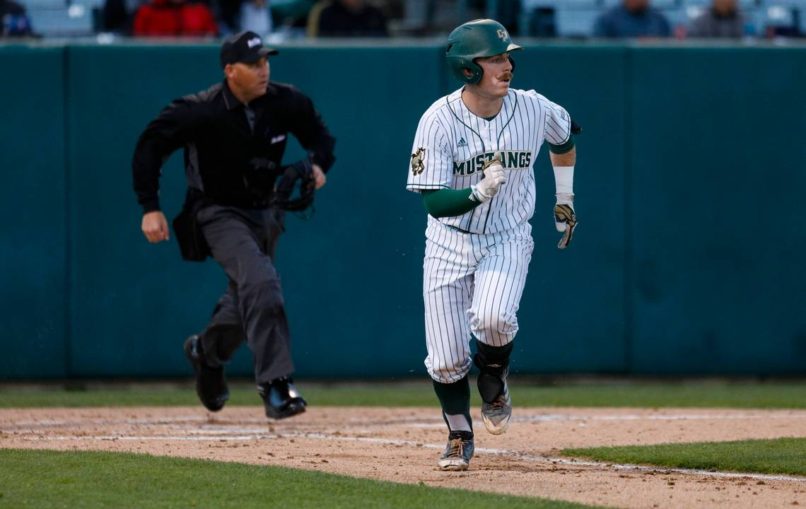
David Middlecamp/The Tribune
Nick Meyer was selected by the Mets in the sixth round of the 2018 MLB draft.
A 21-year-old catcher out of California State Polytechnic, Meyer proved in college that he was able to handle a pitching staff and take control by calling the game.
Upon being drafted, Nick was assigned to Short-A Brooklyn, where he has appeared in 30 games, and has hit .260/.304/.317 across 112 at-bats.
I caught up with Nick last month, where we talked about the beginning of his pro career, what it was like to catch Noah Syndergaard and Jason Vargas when they rehabbed in Brooklyn, as well as him growing up a Cardinals fan and modeling his game after Yadier Molina.
Piersall: Let’s talk about your draft day. Where were you when you got picked and how did you find out?
Meyer: I was actually at my school, Cal State Poly. I had two weeks of school after that so I stayed down there. I was at my house with my roommates and we were just watching on TV. I knew when I was going to get drafted a few picks before, but I didn’t tell anyone. My name popped up and we started celebrating.
My buddy, who is actually now on Tri-City, got picked in the fourth round and he was there too, so we had a big party that day for the both of us. It was pretty special, a great moment.
Piersall: I know you said you found out you were being drafted by the Mets a couple picks beforehand, but prior to draft day, did you have any idea they were interested in drafting you?
Meyer: I talked to them twice I think, which is kind of standard. That’s what every team does, but I talked to them a couple times and you don’t really know who is high on you. My adviser said though that they really wanted me and they were going to give me a good deal if they took me so I was kind of hoping I got picked by them.
I think the highest I could have gone was the third round, and there were a couple teams that wanted me, but it wouldn’t have been as much as I what I ended up getting.
But I’m happy I got drafted by the Mets, it’s a great fit and I was really, really happy when they did.
Piersall: You were talking about your fellow teammate, Alex McKenna, who got picked a couple rounds before you. How special was that to share that draft experience and both getting picked?
Meyer: It was cool. We’ve been together for three years, lived with him for three years, one of my good friends. It was special. We both knew this was our draft year and we didn’t talk about it too much, but talked about stuff we were going through and helped each other out a lot.
It was cool to see us both go and get the whole thing over with and start playing pro ball. I’m excited to see him and see how he’s doing, so it was pretty cool.
Piersall: What is it like to show up and learn about an entire organization, while also having to learn all the new pitchers at the same time?
Meyer: It’s a lot. I mean, I’m kind of used to it, but coming here was definitely more than I ever had to handle. The first couple days here, they didn’t put too much on me, but kind of laid it all on me. What every pitcher has, what they want to do with me, what they want me to do with these pitchers.
I kind of liked it like that. I’d rather just get all the info and let me figure it out, and walk me through it. It took a little while at first to get acclimated and get everything going.
It took me a couple days, maybe a week to figure everything out and get comfortable, but now I’m all settled in and have everything down, so now I just have to play and show everyone what I can do.
Piersall: How was it making that leap from college ball to pro ball? Was there a steep learning curve? Or was it an easy transition for you?
Meyer: So far, it hasn’t been too tough. I mean, I think the biggest thing being a catcher is calling the game, but I was fortunate enough to do that in college, I was given the honors to call the game for two years, so I kind of got that down.
The biggest difference is just showing up each day and putting in the work. All the college guys are already tired, but it’s a grind and it’s different. You show up and it’s your job, so you have to treat it like that.
You just have to wake up and realize you’re fortunate enough to play baseball and some other kids didn’t get that chance, so you have no reason to not go out there and work your ass off and do what you have to do.
So that’s been the biggest thing, just taking care of your body and making sure everyday you’re hydrated and ready to go and play to the best of your abilities.
Piersall: I was talking to Chase Chambers recently and he, like you, said the biggest difference has been playing those 82 games with limited off days. But being a catcher, do you think that’s caught up to you even more? Or is it not really that different?
Meyer: I think for sure it has. The biggest thing is catching three games a weekend and having four off days in college, to coming here and catching three days then only having one day off.
That’s been the biggest thing for me. I’m still trying to figure out how, and what things to do, to keep my body in shape and recover better. But, I catch two or three days in a row and get that one off day, I have to take advantage of it.
I can tell I’m getting tired at times, but a lot of it is mental and I just have to grind through it and get stronger in the offseason.
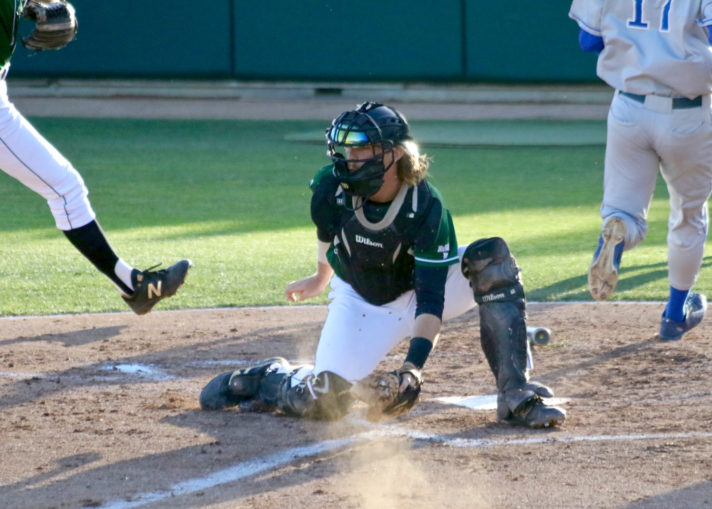
Photo courtesy of Shotgun Spratling D1Baseball
Piersall: Talk to me about catching Jason Vargas and Noah Syndergaard recently. Did you get to chat with them at all?
Meyer: It was awesome. Both of them are great guys. They were super cool with me and talked to me a bunch and taught me some things, so that was part of my favorite things catching them.
Catching them in general was electric. I mean, Syndergaard never threw a fastball under 96 mph. Everything is proven, obviously. But it was pretty cool to see how I stacked up and if I could catch the guy in general, and I think I did a good job.
It’s tough catching a guy for the first time in general, but I got better as time went on, and it was really cool just to see those two guys throw four pitches anytime they want and where they want. It’s also cool just seeing the type of pitchers both of them are.
Syndergaard can get away with throwing his fastball anytime, but Vargas really helps you spot up any of his pitches anytime. It was really cool and I’m glad I got that experience.
Piersall: Was it more different talking to Vargas who has been in the league a lot longer, or did you get better advice from talking to Syndergaard?
Meyer: I think Vargas taught me a little bit more. I mean, I knew he was from Southern California, where I’m from. He went to Long Beach State which was in my conference and I talked to him about that.
He talked to me about transitioning to pro ball and what it takes. Even though he’s a pitcher, he’s been in the game for so long that he knows more than me obviously, and he talked about what it takes to keep your body in line and staying in check off the field.
He talked to me a lot about hitters and what he wanted to do to hitters to be successful and what he does before each start.
He looks at scouting reports for about an hour or two and looks at each hitter, looks at their recent strengths and what pitches he can give them in certain counts. It’s just kind of crazy to see the little things that he does.
It’s tough for him because he doesn’t throw all that hard and doesn’t have that crazy put away pitch, but I’m glad he got to chat with me and teach me a little bit.
Piersall: Your coach at Cal State Poly raved about your skills behind the plate and so did Jim Callis coming into the draft, calling you one of the top defenders in the whole class. How did you get to the point of being that successful behind the plate?
Was it a natural thing that came second nature to you, or did you really have to practice handling a pitching staff?
Meyer: I didn’t start catching until junior year of high school. My brother caught three years on varsity, and I knew I wasn’t going to make varsity at catcher so I played infield. But he graduated and I started catching my junior year and had that raw ability.
I had a good arm but didn’t know some other things. I watched a lot of baseball and watched different catchers, so I tried to model my game after them a little bit.
Right when I got to Cal Poly, my game kind of took off and my coaches taught me so much. They taught me some physical things that made me better, but they also taught me mentally how to catch games and how to take hitters apart and all that.
I had a little bit of a feel for it, but they took my game to the next level and taught me some things that will stick with me my entire life through baseball. I owe a lot to them.
But I watch a lot of baseball, I’ll watch a game where we say lost by 10 runs and what I did wrong.
I also have that bond with a pitcher, knowing what he wants to be, knowing what I want to do and find that medium.
That’s kind of where it started, but this is only my fifth year catching, so I still have a lot to learn and I hope I do learn, and get to that next level.
Piersall: How have you personally worked with your pitching staff in Brooklyn to see the best results?
Meyer: I work them a lot. Everyday, I catch them before games. If I’m not playing, I’ll catch the bullpens. It’s been different, I mean, because it’s their career. In college, everyone kind of trusted me because I was the older guy and knew what I was doing.
Our goal was to win every game, but when you get here, it’s about developing and you don’t want to be too hands on and kind of take away what they want to do because it’s their career. But you want to find out what they want to do and just find that medium.
Now that I’ve caught everyone a few times now, however, I have a feel for everyone and know their best pitches. It takes a little bit of time to get used to, obviously, but I have a really good feel for it now and am really excited to work with the rest of the year, it should be fun.
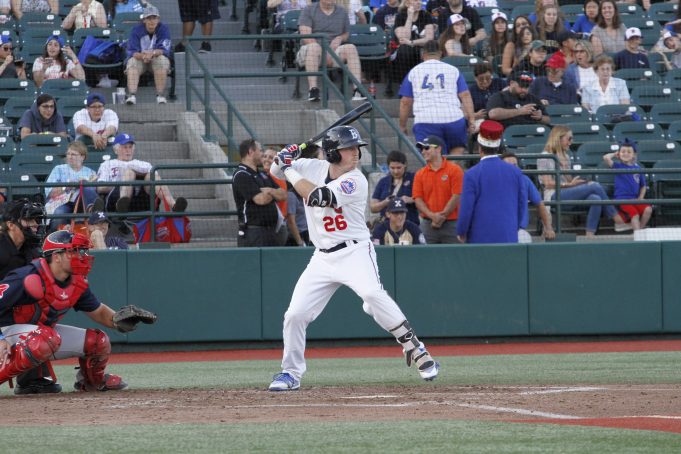
Liz Flynn/Brooklyn Cyclones
Piersall: What pitcher or pitchers have you caught so far in Brooklyn that have stood out to you?
Meyer: I’d have to say Kevin Smith from Georgia. He’s a tall lefty, kind of throws three quarters, has a two seam around 91 mph, a four-seam around 93. He’s dominant, has a wicked slider. He’s a smart pitcher, knows what he’s doing, knows what he’s doing with certain hitters and knows how to take command. He doesn’t waste time, he just wants to go out there and put you away.
Piersall: How has it been for you playing under your manager, Edgardo Alfonzo?
Meyer: It’s been awesome. I watched him when I was younger when he played for the Giants. I got here and talked to him a bunch, talk to him everyday during batting practice. He teaches me something everyday it seems like. He tells me stories about the game and he keeps everything loose. He’s a great manager.
He wants us all to have fun and be successful, he’s been great so far.
Piersall: Did you have a favorite team growing up?
Meyer: I’ve been a Cardinals fan my entire life. Cardinals and Angels. I live maybe 20 minutes away from the Angels, so I’ve seen them since I was really young, but I’ve been a Cardinals fan my whole lif.
Piersall: Do you model your game after Yadier Molina at all?
Meyer: I definitely try to do a lot of things that he does. Obviously he’s the best defensive catcher in baseball. The things he does are kind of crazy. I mean, I try to pick certain parts of his game as well as other guys.
Other than Yadi, I like Willson Contreras, who is similar to Yadi, but is younger and does a lot for the Cubs. He’s a game changer. He really knows how to call a game and I really like watching him too.
Piersall: Now that you’ve been drafted and have started playing pro ball, what are your goals for the rest of this year?
Meyer: I just want to keep it going. I want to have a solid and healthy year. I don’t really care too much about my numbers, I just want to play everyday and get my at-bats, hit the ball hard every time. Put good wood on it and hopefully, we can keep things rolling.
Piersall: Thank you so much for taking your time out to talk to me, man. I really appreciate it.
Meyer: Oh, absolutely. Thank you.
Be sure to stay updated with Nick’s progress as he works his way through the minors. He can be found on Twitter, @NicksCards22.


